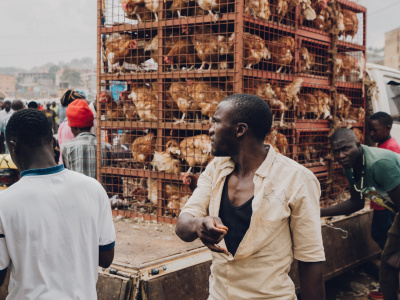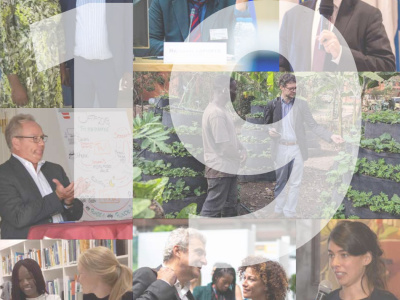
Bananas and bottlenecks: Piloting regional value chain cooperation for food security
After decades of protocols and high-level declarations without implementation, regional integration is slowly happening in many parts of Africa, often driven by commercial moves.
More recently, regional markets and especially public-private-partnerships (PPP) are becoming fashionable approaches to promote food security. Many bottlenecks remain, however, both in policy reform follow-up and asymmetric benefits for entrepreneurs along the food value-chains.
RECs, their member states and interested stakeholders should pilot concrete results to show that regional integration can become more credible and effective, and contribute to food security.
As part of ECDPM’s support to RECs and the Comprehensive Africa Agriculture Development Programme (CAADP), we recently visited a banana value chain development company in Kampala, Uganda.
They buy bananas from smallholders and process them to obtain fresh vacuum-sealed peeled banana packages, vinegar, textiles and animal feeds, offering also technology and support services to small farmers. They are proud of contributing to better, safer and longer storage of the number-one staple in Uganda as well as to more value-addition for the economy, and they have started buying bananas also from Kenya.
However, innovative companies like this one and small farmers across Africa in general, still face too many bottlenecks. In terms of both a really enabling business environment and accessing regional markets (which are often much closer to them, just across the border, compared to distant capital cities, ports or airports).
In fact, the vast majority of smallholders are likely to be left out by standard value-chain development initiatives at national level: their quantity and quality are too low to attract buyers; they are too small to be able to afford business development services; lack basic market information. In Uganda 30% of smallholder’s produce is rejected at supermarket distribution centres due to low quality. Farmers and processors also see the value of the fashionable objective of “connecting farmers to markets” (e.g. to access better technologies, seeds fertilisers in order to be able to produce year round), but in reality regional integration still suffers heavily from lack of policy reform follow-up by governments. Products rejected at the border for failing to meet standards is one of the biggest Non-Tariff Barriers (NTB) to trade in the Eastern Africa Community, even if it is a Customs Union and NTB-reduction is very high in the official agenda.
There is now increasing attention to the design and implementation of regional CAADP plans for food security and PPP approaches like Grow Africa, where companies sign “letters of intent” for private investment alongside governments’ commitments to reforms and donors’ pledges for support. But those attempts to modernize African agriculture by combining trade, public and private investment (from Africa and abroad) and aid are still producing little results.
The Annual Grow Africa Report for 2012 found that:
implementation is slowed by the following constraints: regulatory and policy barriers preventing rapid implementation on the ground; government capacity to respond quickly; access to capital for domestic companies and smallholders; partnership platforms not always functional for support of multi-stakeholder collaboration; and difficulty for companies in commercially justifying non-competitive investments, e.g. holistic farmer support, developing complementary crops, and M&E.
To really address the multiple challenges faced by small farmers (inputs, loans, rural infrastructure, business skills) and to really help entrepreneurs like the banana processors, what is needed is piloting pragmatic and participatory regional value chain cooperation. Establishing platforms for regular public-private dialogue for policy reform and increasing investment can do this. By bringing together existing initiatives and lessons learnt on value chain development projects and current efforts for CAADP-related PPP dialogue, RECs and their member states, together with private sector representatives can ensure both political and commercial buy-in to regional value-chain cooperation. Development partners can certainly contribute by providing support for non-profitable activities that private entrepreneurs could not finance themselves.
Placing such regional pilots in the context of the CAADP could guarantee a truly multi-stakeholder process by including all relevant partners and especially ensure smallholders also benefit from regional integration.
ECDPM has started supporting East African actors in a pilot to establish a regional stakeholders’ platform in Uganda and Kenya to develop and integrate horticulture and diary value chains for sustainable trade and food security in the context of the CAADP.
The views expressed here are those of the author, and may not necessarily represent those of ECDPM.




